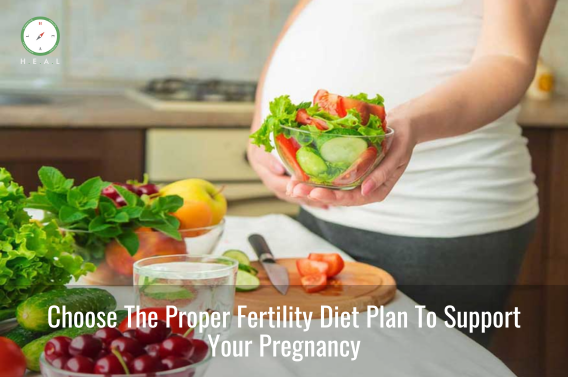A fertility diet plan is a carefully curated eating regime designed to optimize reproductive health and increase the chances of conception. It focuses on incorporating nutrient-rich foods that support hormonal balance, promote ovulation, maintain a healthy body mass index (BMI), and enhance the quality of eggs and sperm.

To implement a fertility diet plan with Indian food effectively, consider the following guidelines:
Whole Foods Rich in Antioxidants:
Prioritize fruits, vegetables, nuts, and seeds, which are abundant in antioxidants. These nutrients help protect reproductive cells from damage caused by free radicals, which can arise from exposure to toxins or metabolic processes in the body.
Healthy Fats, Omega-3s:
Include sources of healthy fats such as omega-3 fatty acids found in chia seeds, and flaxseed oil. These fats play a crucial role in regulating hormones essential for ovulation and nourishing the endometrial lining, which is crucial for implantation.
Lean Protein Sources:
Incorporate lean protein sources like beans and lentils. These foods provide essential amino acids necessary for developing follicles during ovulation, supporting healthy sperm and egg production.
Adequate Folic Acid Intake:
Ensure sufficient intake of folic acid (folate), which is vital for both men and women to support healthy sperm and eggs. Common sources of folic acid include leafy greens, fortified cereals, and legumes.
Avoid Processed Foods, Caffeine, and Alcohol:
Limit or avoid processed foods, caffeine, and alcohol, as they can disrupt hormonal balance and negatively impact fertility. Instead, focus on whole, unprocessed foods to provide essential nutrients without unwanted additives or chemicals.
By adhering to a fertility diet plan with Indian food that emphasizes wholesome, nutrient-dense foods and avoids potentially harmful substances, individuals and couples can take proactive steps to optimize their fertility and increase their chances of conceiving.

Embracing a fertility meal plan isn't merely a short-term adjustment to your eating habits; it's a lifestyle choice with multifaceted benefits, particularly for women endeavouring to conceive. Here's a comprehensive look at the advantages of adhering to an Indian diet chart tailored for fertility:
Enhanced Hormonal Balance:
A well-rounded and nutritious fertility diet contributes to regulating hormones critical for conception. Hormonal imbalances can manifest in various symptoms such as irregular menstrual cycles, hot flashes, and mood fluctuations, all of which can impact fertility. By incorporating foods known to support hormonal balance and address issues like irregular periods, individuals can potentially increase their chances of conceiving.
Increased Nutrient Intake:
Opting for nutrient-dense foods like fruits, vegetables, whole grains, and lean proteins ensures that the body receives essential vitamins and minerals crucial for reproductive health. These nutrients not only support fertility but also bolster the immune system, guarding against infections that might impede conception.
Reduced Inflammation:
Processed and sugary foods can trigger inflammation within the body, paving the way for chronic conditions such as diabetes, heart disease, and fertility-related issues. Conversely, a fertility-focused diet rich in antioxidants helps combat inflammation, fostering a healthier internal environment conducive to conception.
Maintenance of Healthy Weight:
Achieving and maintaining an optimal weight is pivotal for fertility, as both excess weight and being underweight can disrupt hormonal balance and menstrual cycles, hindering the conception process. By following a fertility meal plan tailored to individual nutritional needs, individuals can strive to attain a healthy weight, thus optimizing their chances of conceiving.
Enhanced Overall Health:
Beyond its direct impact on fertility, adopting a fertility meal plan can yield broader health benefits, potentially reducing the risk factors associated with gestational diabetes, pre-eclampsia, and other pregnancy-related complications. By nurturing overall health through mindful dietary choices, individuals can cultivate an environment conducive to a successful and healthy pregnancy.

Certainly! The Fertility Diet is designed to optimize reproductive health and increase the chances of conception. A fertility diet plan with Indian food emphasizes the consumption of nutrient-rich foods that support fertility, such as fruits, vegetables, whole grains, lean proteins, and healthy fats. These foods provide essential vitamins, minerals, and antioxidants that play a crucial role in reproductive function.
For individuals struggling with weight issues, the Fertility Diet can be particularly beneficial. Maintaining a healthy weight is essential for fertility, as both obesity and being underweight can adversely affect reproductive hormone levels and menstrual regularity. By promoting a balanced diet and encouraging regular physical activity, the Fertility Diet helps individuals achieve and maintain a healthy weight, thereby improving their fertility prospects.
Moreover, for those dealing with specific reproductive health conditions like Polycystic Ovary Syndrome (PCOS), the Fertility Diet can be customized to address their unique needs. For instance, individuals with PCOS may benefit from reducing their intake of refined carbohydrates and sugars, as these can exacerbate insulin resistance and hormonal imbalances associated with the condition. Instead, focusing on complex carbohydrates, lean proteins, and healthy fats can help stabilize blood sugar levels and support hormonal balance, thus enhancing fertility.
Additionally, the Fertility Diet recommends limiting or avoiding certain substances known to negatively impact fertility, such as caffeine and alcohol. By minimizing these factors, individuals can optimize their reproductive health and improve their chances of conceiving.
Overall, the Fertility Diet promotes a balanced and wholesome approach to nutrition, emphasizing the importance of whole, nutrient-dense foods while discouraging the consumption of processed and unhealthy options. By making these dietary choices, individuals not only enhance their fertility but also support their overall health and well-being.
It's important to acknowledge that while a fertility diet plan with indian food offers numerous potential benefits, individual dietary requirements and portion sizes may vary. Consulting with a healthcare professional or a registered dietitian can help tailor a fertility-focused eating regime to suit specific needs and maximize its effectiveness in supporting conception and reproductive health.
Famous health transformational coach Vidhi Beri has a wide range of experience in lactation and nutritional counselling of infants and toddlers, dietary and nutritional counselling for fertility treatment and has shared many valuable tips with the new mother. She is also working with a focus on Movement, Nutrition and Mindfulness practices for weight control and improvement of overall health and disease reversal. For more details kindly visit the official website http://www.vidhiberi.com/.